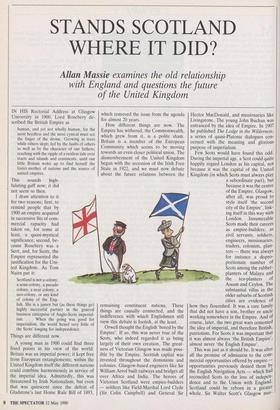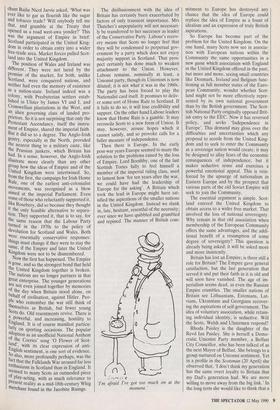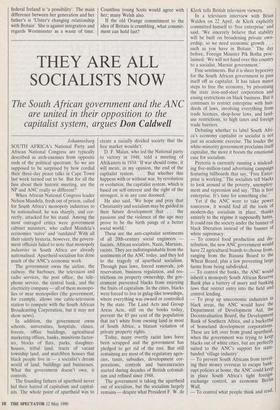STANDS SCOTLAND WHERE IT DID?
Allan Massie examines the old relationship
with England and questions the future of the United Kingdom
IN HIS Rectorial Address at Glasgow University in 1900, Lord Rosebery de- scribed the British Empire as
human, and yet not wholly human, for the most heedless and the most cynical must see the finger of the divine. Growing as trees while others slept; fed by the faults of others as well as by the character of our fathers; reaching with the ripple of a restless tide over tracts and islands and continents, until our little Britain woke up to find herself the foster-mother of nations and the source of united empires.
This sounds high- faluting guff now; it did not seem so then.
I draw attention to it for two reasons; first, to remind people that by 1900 an empire acquired in successive fits of com- mercial rapacity had taken on, for some at least, a quasi-mystical significance; second, be- cause Rosebery was a Scot, and, for Scots, the Empire represented the justification for the Uni- ted Kingdom. As Tom Nairn put it:
Scotland is not a colony, a semi-colony, a pseudo colony, a near colony, a neo-colony, or any kind of colony of the Eng- lish. She is a junior but (as these things go) highly successful partner in the general business enterprise of Anglo-Scots imperial- ism. . . . When the going was good for imperialism, the world heard very little of the Scots' longing for independence.
Things are differerit now.
A young man in 1900 could find three fixed points in his view of the world: Britain was an imperial power; it kept free from European entanglements; within the United Kingdom itself the different nations could combine harmoniously in service of the imperial idea. Admittedly, this was threatened by Irish Nationalism, but even that was quiescent since the defeat of Gladstone's last Home Rule Bill of 1893, which removed the issue from the agenda for almost 20 years.
How different things are now. The Empire has withered; the Commonwealth, which grew from it, is a polite sham. Britain is a member of the European Community which seems to be moving towards an even closer political union. The dismemberment of the United Kingdom began with the secession of the Irish Free State in 1922, and we must now debate about the future relations between the remaining constituent nations. These things are causally connected, and the indifference with which Englishmen still view this debate is foolish, at the least.
Orwell thought the English 'bored by the Empire'. If so, this was never true of the Scots, who indeed regarded it as being largely of their own creation. The great- ness of Victorian Glasgow was made poss- ible by the Empire. Scottish capital was invested throughout the dominions and colonies. Glasgow-based engineers like Sir William Arrol built railways and bridges all over Africa and India. The heroes of Victorian Scotland were empire-builders — soldiers like Field-Marshal Lord Clyde (Sir Colin Campbell) and General Sir
Hector MacDonald, and missionaries like Livingstone. The young John Buchan was entranced by the idea of Empire. In 1907 he published The Lodge in the Wilderness, a series of quasi-Platonic dialogues con- cerned with the meaning and glorious purpose of imperialism.
This was just as it should be. It was after all the promise of admission to the com- mercial opportunities offered by empire — opportunities previously denied them by the English Navigation Acts — which had reconciled Scots to the loss of indepen- dence and to the Union with England. Scotland could be reborn in a greater whole. Sir Walter Scott's Glasgow mer- chant Bailie Nicol Jarvie asked, 'What was ever like to gar us flourish like the sugar and tobacco trade? Will onybody tell me that, and grumble at the Treaty that opened us a road west-awa yonder?' This was the argument of Empire in brief: Scotland participated in the United King- dom in order to obtain entry into a wider free-trade area. Market forces pulled Scot- land into the United Kingdom. The position of Wales and Ireland was different., They were not lured by the promise of the market, for both, unlike Scotland, were conquered nations, and neither had even the memory of existence as a nation-state. Ireland indeed was a colony, with Presbyterian settlers estab- lished in Ulster by James VI and I, and Cromwellian plantations in the West, and an alien governing class of landed pro- prietors. So it is not surprising that only the Protestant Ascendancy, itself the instru- ment of Empire, shared the imperial faith. But it did so to a degree. The Anglo-Irish gentry, especially in the North, provided the nearest thing to a military caste, like the Prussian junkers, which Britain has had. In a sense, however, the Anglo-Irish illustrate more clearly than any other group how the ideas of Empire and of the United Kingdom were intertwined. So, from the first, the campaign for Irish Home Rule, one of the earliest anti-colonialist movements, was recognised as a blow aimed at the imperial Parliament. Even some of those who reluctantly supported it, like Rosebery, did so because they thought it the only feasible alternative to separa- tion. They supported it, that is to say, for the same reason that the Labour Party turned in the 1970s to the policy of devolution for Scotland and Wales. Both were essentially conservative responses: things must change if they were to stay the same, if the Empire and later the United Kingdom were not to be dismembered. Now the first has happened. The Empire Is gone, and so the strongest bond that held the United Kingdom together is broken. The nations are no longer partners in that great enterprise. The younger generations are not even joined together by memories of the day when Britain stood alone, on behalf of civilisation, against Hitler. Peo- Ple who remember the war still think of themselves as British, but fewer young Scots do. Old resentments revive. There is England. Powerful, and increasing, hostility to cagland. It is of course manifest particu- larly on sporting occasions. The popular adoption as an unofficial National Anthem of the Corries' song '0 Flower of Scot- and', with its clear expression of anti- English sentiment, is one sort of evidence. So also, more profoundly perhaps, was the fact that the Falklands War aroused far less enthusiasm in Scotland than in England. It seemed to many Scots an outmoded piece of Play-acting, with as much relevance to present reality as a mid-18th-century Whig merchant found in the Jacobite Risings. The disillusionment with the idea of Britain has certainly been exacerbated by factors of only transient importance. Mrs Thatcher's unpopularity will not necessari- ly be transferred to her successor as leader of the Conservative Party. Labour's recov- ery means that Scots no longer feel that they will be condemned to perpetual gov- ernment by a party which does not enjoy majority support in Scotland. That pros- pect certainly has done much to weaken attachment to the Union. However, Labour remains, nominally at least, a Unionist party, though its Unionism is now diluted; it is not what it was in the 1960s. The party has been forced to play the Nationalist card itself. It promises to deliv- er some sort of Home Rule to Scotland. If it fails to do so, it will lose credibility and support. On the other hand Labour leaders know that Home Rule is a gamble. It may reconcile Scots to a new form of Union. It may, however, arouse hopes which it cannot satisfy, and so provoke calls for a fuller measure of independence.
Then there is Europe. In the early post-war years Europe seemed to many the solution to the problems raised by the loss of Empire. Lord Boothby, one of the last Scottish Tories fully to feel himself a member of the imperial ruling class, used to lament how 'for ten years after the war, we could have had the leadership of Europe for the asking'. A Britain which took the lead in Europe might have sat- isfied the aspirations of the smaller nations in the United Kingdom. Instead we slunk in, late, hesitant, resentful of the necessity; ever since we have quibbled and grumbled and repined. The manner of British corn- 'I'm afraid I've got too much on at the moment.' mitment to Europe has destroyed any chance that the idea of Europe could replace the idea of Empire as a fount of idealism and an expression of truly British aspirations.
So Europe has become part of the problem for the United Kingdom. On the one hand, many Scots now see in associa- tion with European nations within the Community the same opportunities in a new guise which association with England in the United Kingdom offered in the past; but more and more, seeing small countries like Denmark, Ireland and Belgium func- tioning as full member states of the Euro- pean Community, wonder whether Scot- land might not be more effectively repre- sented by its own national government than by the British government. The Scot- tish National Party originally opposed Brit- ish entry to the EEC. Now it has reversed policy, and seeks 'Independence in Europe'. This demand may gloss over the difficulties and uncertainties which any proposal to secede from the United King- dom and to seek to enter the Community as a sovereign nation would create; it may be designed to allay fears of the economic consequences of independence; but it makes seductive sense and exercises a powerful emotional appeal. This is rein- forced by the upsurge of nationalism in Eastern Europe and by the prospect that various parts of the old Soviet Empire will seek to join the Community.
The essential argument is simple. Scot- land entered the United Kingdom to obtain access to a wider free market. That involved the loss of national sovereignty. Why remain in that old association when membership of the European Community offers the same advantages, and the addi- tional benefit of a resumption of some degree of sovereignty? This question is already being asked; it will be asked more and more insistently.
Britain has lost an Empire; is there still a role for Britain? The Empire gave general satisfaction, but the last generation that served it and put their faith in it is old and will soon have vanished. The age of im- perialism seems dead, as even the Russian Empire crumbles. The smaller nations of Britain see Lithuanians, Estonians, Lat- vians, Ukrainians and Georgians recover- ing the aspirations of self-government. The idea of voluntary association, while retain- ing individual identity, is seductive. Will the Scots, Welsh and Ulstermen respond?
Rhoda Paisley is the daughter of the Revd Ian Paisley. She is herself a Demo- cratic Unionist Party member, a Belfast City Councillor, who has been talked of as the next Mayor of Belfast. She belongs to a group nurtured on Unionist sentiment. Yet in a profile in the Scotsman (20 April) she observed that, 'I don't think my generation has the same overt loyalty to Britain that my Dad's generation had. We are more willing to move away from the big link.' In the long term she would like to think that a federal Ireland is 'a possibility'. The main difference between her generation and her father's is 'Ulster's changing relationship with Britain'. She is against integration and regards Westminster as a waste of time. Countless young Scots would agree with her; many Welsh also.
If the old Orange commitment to the idea of Britain is crumbling, what commit- ment can hold fast?






























































 Previous page
Previous page